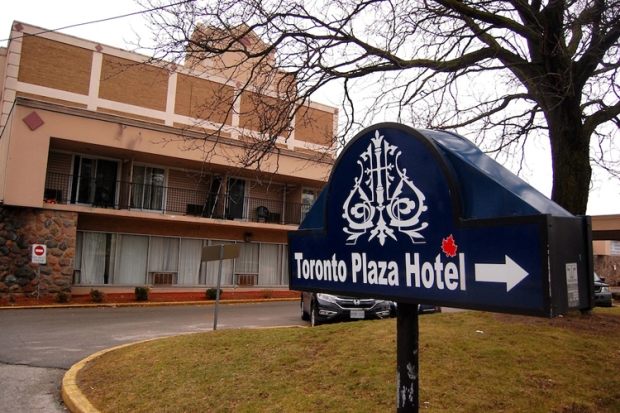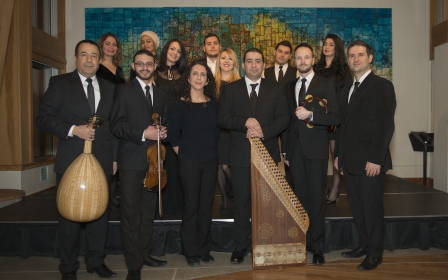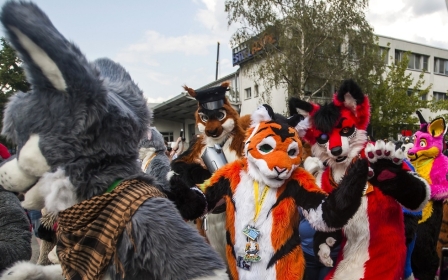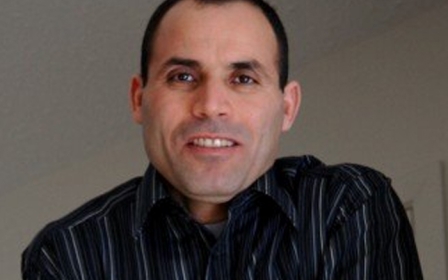Syrian refugees anxious to find homes, jobs in Canada
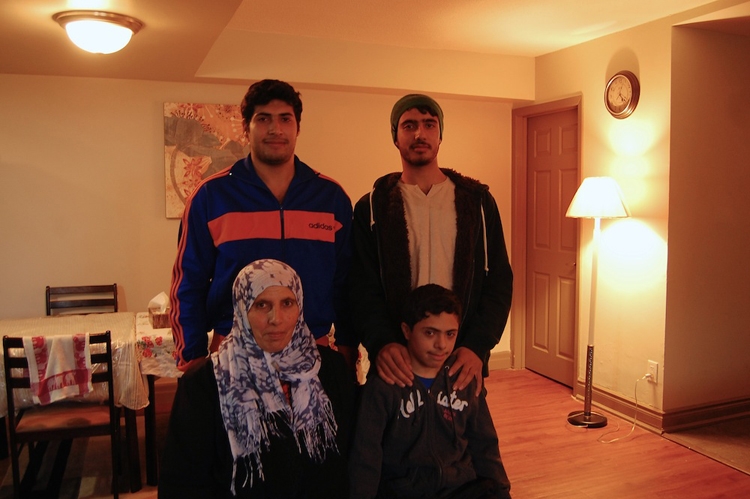
TORONTO, Ontario - Mohammad al-Mohammad knows that finding his first home in Canada is not going to be easy.
Originally from a suburb of Aleppo, the Syrian father of four landed in Toronto on 24 February after spending three-and-a-half years in southern Turkey.
Now, he’s looking for a home large enough to accommodate an extended family of 10 people, including his wife, Zaynab, their children, and his mother, father, brother and sister.
“We really are struggling to find a house. We need the government to hear our voices. I hope they can help us,” said Mohammad, who said that he has visited two homes so far, but neither suited his family’s needs.
The 27-year-old said the language barrier has been his biggest challenge since arriving in Canada. He’s picked up about 50 words of English so far, but he hasn’t had time to attend language classes yet, he said.
“I have to find a house,” Mohammad said from a meeting room at the Toronto Plaza Hotel, one of a handful of Toronto-area hotels where the Canadian government has housed Syrian refugees as they search for permanent accommodation.
“After that, I will go to study, and my wife, too.”
69 percent found permanent homes
Canada met its goal of welcoming 25,000 Syrian refugees by the end of February.
“We have reached a significant milestone, but the work continues as we begin to integrate Syrian refugees into our communities,” John McCallum, Canada’s Minister of Immigration, Refugees and Citizenship, said in a statement at the time.
As of 17 March, over 26,100 Syrian refugees had landed in Canada, while another 2,263 Syrians have approved refugee status applications but have not yet arrived in the country.
The government has sponsored nearly 15,000 of the refugees, while the others have been privately sponsored (by community groups and others) or re-settled through a blended programme.
While the number fluctuates, a spokeswoman for Immigration, Refugees and Citizenship Canada told Middle East Eye that 69 percent of the government-supported Syrian refugees have moved into permanent housing.
“With the flow of arrivals now slowing down, we can expect the proportion of people who can move into permanent housing to increase,” Nancy Caron said in an emailed statement.
Caron said that some refugees end up staying in temporary accommodation for several weeks, depending on the local housing market, while others move into homes much faster.
“It is also important to recognise that each Syrian refugee family is unique, and depending on the size of their family and their particular needs, the amount of time they spend in a temporary accommodation facility may vary,” she said.
Government allowances
Ahmad Radi, 23, moved into a ground-floor apartment with his mother and two younger brothers in Etobicoke, west of Toronto, after spending about six weeks in a hotel alongside 72 other Syrian families.
“When we were in the hotel, there was no place to go and nothing to do. Now we are comfortable,” Radi, originally from Damascus, told MEE from his family’s new living room.
The family receives $2,200 per month in government allowances, but they aren’t left with much after paying $1,600 for rent, Radi explained.
Both Ahmad and his brother, Mahmoud, 19, are enrolled in English classes at a nearby community centre, and they hope to get jobs soon to help pay their expenses while also continuing their educations.
“I’m just thankful to have a home that is safe,” their mother, Safeyyah al-Masri, told MEE.
“There was no future at all in Jordan,” she said. The family lived in the Jordanian city of Irbid after leaving Syria in 2012. “(In Canada), there is education, jobs … our future is here. We’re here now, thank God.”
Mary Cellucci, spokesperson for COSTI Immigrant Services, the group responsible for helping government-sponsored refugees settle in Toronto, said many families have settled in Scarborough and Mississauga, cities to the east and west of Toronto where rent is more manageable.
Cellucci told MEE that proximity to public transportation and basic things like grocery stores and pharmacies are also important considerations when choosing a home.
“All of those factors are at play when you have a limited income,” she said.
Cellucci said about 1,200 people will have moved out of the hotel and into homes by next week.
Ottawa provides government-sponsored refugees with income support for up to one year after their arrival, or until they are self-sufficient, up to a maximum of $25,000 per family, Caron said.
This includes a start-up sum to help families set up their homes, as well as monthly payments. The amounts are based on the social assistance rates set by the province the refugees have settled in, and vary depending on family size.
A refugee family of four (two parents and two children under 18) living in Toronto, for example, would receive approximately $5,455 as a start-up payment and $1,508 in monthly payments, Caron said. A single refugee in Toronto, meanwhile, would get about $2,065 as a start-up payment, and $811 each month.
‘Informal buddy system’
Large family sizes and high rent and living costs in Toronto – one of Canada’s most expensive cities – have made finding affordable housing difficult, and many Syrian refugees do not speak English, which further complicates the process.
Syrian-Canadian Maher Azem set up the Syrian Canadian Foundation (SCF) after seeing that Syrian refugees needed help settling in to life in Canada. The group, which counts two staff members and a number of volunteers, now works in partnership with COSTI to help settle the newcomers.
Azem said tempering families’ expectations before they tour potential apartments has been a big part of the job. Volunteers also help with translations between Arabic and English during meetings with landlords and realtors.
“In general, you feel that there’s a need for community support, and that was missing, so we’re filling this gap,” Azem told MEE.
He said the SCF is also hoping to build links between the refugees and local Syrian or Arab families in their neighbourhoods – “an informal buddy system” – to help them get acquainted to the area, show them where to do groceries and get other services.
“That’s happening informally,” he said.
Next step: Jobs
But the difficulties for Syrian refugees don’t stop at housing.
Basil Mahmoud found a home for his family in Etobicoke, just west of Toronto, but the 38-year-old from Deraa now has a new challenge: finding a job.
“I don’t want to rely on the government,” Mahmoud told MEE from a job fair at the Toronto Plaza Hotel this week, where he was having his resume prepared in English.
Mahmoud worked in restaurants in Syria, Lebanon and Jordan – including several years as a manager at fast-food chain Kentucky Fried Chicken (KFC) and a shawarma restaurant – and he said he hopes to stay within the restaurant field.
But he knows he will have to learn English for that to happen. While his four children – aged five to 12 years old – are in school, he spends five hours every day taking English-language courses.
“I am trying to improve my English. In a restaurant, you have to deal with employees and customers, so your language and conversation skills must be strong,” he said in Arabic through a translator.
“I need to depend on myself. I don’t want to depend on others.”
Julie Darboh, COSTI’s director of employment services, said the organisation hosts a series of employment information sessions, ranging from how to look for a job in Ontario to how to write a resume.
On Tuesday, the group hosted a job fair with eight local employers. A pre-requisite for participation was that the employers agreed to incorporate English-language courses into the workdays of potential hires.
“The employers provide us with time to take language instruction into the workplace. So people are making money and also getting the language skills they need,” Darboh explained.
She said for many refugees, finding a job will ease their anxieties about starting their new lives in Canada. “People are here with their families and they really want to work,” she said. “They really want to make their lives better.”
Middle East Eye propose une couverture et une analyse indépendantes et incomparables du Moyen-Orient, de l’Afrique du Nord et d’autres régions du monde. Pour en savoir plus sur la reprise de ce contenu et les frais qui s’appliquent, veuillez remplir ce formulaire [en anglais]. Pour en savoir plus sur MEE, cliquez ici [en anglais].


